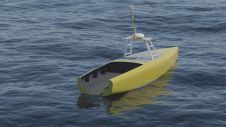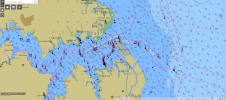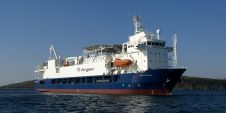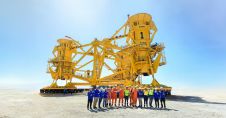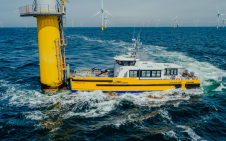The OI 2008 Conference – Climate, Energy and Security
Oceanology International 2008 is set to take place in March 2008 with the theme ‘Technology, Sustainability and the Ocean Environment’. It will offer product demonstrations, education and training to explore the role of marine science and technology in tackling these challenges. Hydrointernationaltakes this opportunity to interview the chairman of Oceanology International, Ralph Rayner, on the highlights of the event and new developments in the industry.<P>
Please tell us a bit about yourself, as way of introduction to our readers?
I am an oceanographer by training and have a background in provision of commercial ocean science and technology products and services. I have been involved in Oceanology International for over 25 years, have chaired the event once before and have presented papers at the conference on many occasions. It is an honour to be asked to chair the conference once again and a pleasure to work with the Institute of Marine Engineering, Science and Technology (IMarEST), the Society for Underwater Technology (SUT) and a dedicated technical committee to put together what we believe will be a seminal event.
What are the themes for Oceanology International (OI) 2008, and the basic thinking and aims behind these choices?
Oceanology International is a global event and the selected themes for the 2008 conference are in keeping with this. The four themes of climate change, meeting future demands for energy, and ensuring environmental and civil security are closely interconnected. They have been selected to allow the international marine science and technology community to showcase how it is contributing to the pressing global challenges of meeting future demands for energy at the same time as mitigating and adapting to climate change and ensuring protection of the environment and civil society.
In what ways will OI 2008 differ from previous Oceanology International events? What would you say to those who may be considering attending this event but remain undecided – why should they attend?
The event will be more focused on emerging market opportunities and will give an opportunity for those attending to learn more about where the sector is heading in the coming years.
As Chairman, can you predict a few highlights of the event? In particular, can you discuss the opening Plenary Session and the four themes to be covered in the technical sessions?
The conference’s Technical Committee has gathered a group of speakers who will provide an overview of the challenges and opportunities for each theme. Each of the keynote speakers is an acknowledged international expert. We can expect the opening Plenary to provide those attending OI 2008 with a comprehensive overview of some of the most pressing issues for the future – issues that will be the predominant drivers for marine science and that will shape future markets for marine technology.
The session “The Oceans and Climate Change” will showcase the latest technological developments that are being used to help monitor and understand how the oceans are responding to a changing climate. It will include case studies of the application of these technologies, describing the results of some of the latest work on issues such as monitoring Arctic ice and understanding changes in the circulation of the Atlantic Ocean.
In “Energy from the Oceans”, the latest developments in marine information needed by the offshore oil and gas industry will be presented. It will include papers on the increasingly important role of AUV technologies in supporting deep-water oil and gas exploration and production. Other papers will explore the analysis and interpretation of marine information in support of offshore design and operations.
Many of the technologies developed to support the offshore oil and gas industry are finding application in the rapidly growing offshore renewables sector. The session “Energy from the Oceans” includes papers describing the types of renewable energy systems being implemented and the ways in which marine science and technology are being applied to the support of this increasingly important sector.
There is a growing awareness of the vulnerability of the offshore and coastal environment to both natural events and human pressures. “Environmental Security” focuses on the latest developments in monitoring and forecasting natural events such as tsunamis, and there will also be papers covering aspects of the protection of the coastal environment.
The growing importance of protecting maritime activities from acts of terrorism has created a new market for technologies to detect threats to shipping and coastal installations such as ports and terminals. “Civil Security” describes new technological tools to assist in protecting vulnerable installations, and there will also be papers on other aspects of civil security such as search and rescue operations.
What do you perceive will be the benefits for participants of the plenary and other sessions at OI 2008? What do you hope attendees will take away, firstly from the conference and secondly from the exhibition?
Those attending the plenary and conference sessions will take away an increased awareness of the vital role that marine science and technology must play in meeting global challenges. In the exhibition hall, attendees will be able to see how the marine science and technology community is rising to these challenges through the development of new products and services.
How will the conference and exhibition compliment each other in terms of the technologies being displayed and the technical presentations?
One of the key characteristics of Oceanology International is that it brings together a diverse range of exhibitors who provide products and services suited to a range of markets. The conference aims to complement the exhibition by showing how these products and services are being applied to meet specific needs in established and emerging markets associated with pressing areas of global concern.
The four themes of the conference relate to activities that are interlinked. It seems we cannot consider one without the other. Can you summarise the relationship between climate change, energy, and environmental and civil security?
Our industrial society depends on access to sufficient energy resources, but our present pattern of energy use is the root cause of climate change. At the same time, the 21st century will mark the end of the ‘oil and gas era’ as production of oil and, later, natural gas peaks and begins to decline. Climate change and unsustainable use of non-renewable energy resources are very closely linked and can result in major threats to the environment and disruption of civil society.
What are the principal contributions that the oceanology sector can make towards solving the problems created by climate change?
The marine science and technology sector makes two principal contributions to the climate change problem. Firstly, better understanding and monitoring of the oceans makes a major contribution to improving the ability to project future climate because the oceans are the driver of the climate system. Secondly, marine technologies will be critical to enabling possible alternative means of meeting future energy demands in a safe and environmentally acceptable way.
?Smaller, lower power, lower cost means of monitoring the marine environment are technical challenges that the oceanology sector has to solve. These developments have to be accompanied by better tools for making use of information about the marine environment.
Do you believe that technical development is an evolutionary process or can you identify a single development/invention that has provided a breakthrough for the advancement of oceanographic science, for example?
Generally evolutionary, but with occasional leaps in development. For example, the development of acoustic Doppler techniques to monitor currents or sensors in space to monitor sea surface temperature over the entire globe.
What is your perception of the politicians’ view of the importance of oceanology?
Most politicians have little or no awareness of the sector. One of the roles of Oceanology International should be to increase awareness by exposing politicians to the contribution that marine science and technology is making to important areas of societal and economic benefit. We will be making considerable efforts to attract politicians to the event and especially to the Plenary Session and the Distinguished Lecture.
Based on the abstracts, can you suggest significant conference papers?
The paper on the results of monitoring of the Atlantic overturning circulation is particularly significant since it will illustrate how marine technology is being applied to very long-term monitoring of features of the ocean that play a critical role in climate.
What are you hoping that OI 2008 will achieve?
Exposure of the exhibitors and delegates to new market opportunities and a wider recognition of the contribution that marine science and ocean technology are making to helpto solve pressing global challenges.
Dr R. F. Rayner - Following completion of a first degree in biology, and a Master’s in underwater science and technology, Dr. Ralph Rayner undertook research into the physical oceanography of the Indian Ocean Chagos Archipelago, leading to award of his doctorate in 1982.
Throughout his professional career he has been engaged in the commercial provision of environmental and oceanographic products and services. In parallel with his commercial career he has played an active part in the marine scientific community though membership of professional associations, committees and working groups, lecturing and authorship of technical and scientific papers.
In 1994 he was responsible for the formation of Global Environmental and Ocean Sciences (GEOS). GEOS was subsequently acquired by the Fugro Group in 1996. He continued to be responsible for the overall direction of the business, which grew to become a world leader in the provision of oceanographic and marine meteorological services.
In 2000 he initiated the formation of Ocean Numerics, a company specialising in the practical applications of ocean hindcasting and forecasting.
Having achieved his goal of developing the leading provider of commercial metocean services, he left the Fugro Group in mid-2005 in order to be able to widen his scientific and technical involvement in operational oceanography.
He continues to chair Ocean Numerics and is working at Board level with a number of specialist marine science and technology businesses in the UK and overseas. He currently serves as a non-executive director of Sonardyne International Limited.
Since leaving Fugro he has substantially increased his involvement in helping to advance the development of global operational oceanography. He serves on the scientific steering committee for the Global Ocean Observing System (GOOS), and various committees of the Group on Earth Observation and the European Global Monitoring for Environment and Security (GMES) initiative.
He also contributes to fostering the interface between science and industry as chair of the IMarEST Marine Information Alliance and as a member of the Executive Council of the Association of Marine Scientific Industries.

Value staying current with hydrography?
Stay on the map with our expertly curated newsletters.
We provide educational insights, industry updates, and inspiring stories from the world of hydrography to help you learn, grow, and navigate your field with confidence. Don't miss out - subscribe today and ensure you're always informed, educated, and inspired by the latest in hydrographic technology and research.
Choose your newsletter(s)













